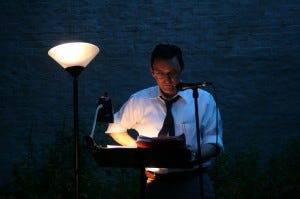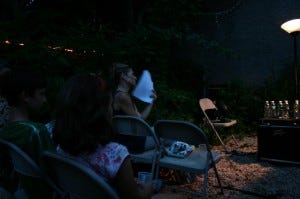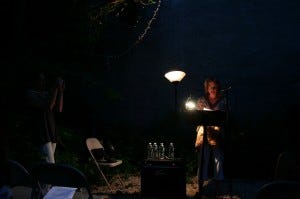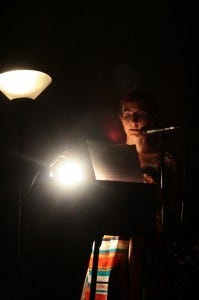news
Words Under the (Invisible) Stars: The Literary Review Launches “Encyclopedia Britannica”

1. Unnameable Books, home of the secret garden.

The subways are sweltering, a weird, dirty-foot aroma permeates the air, and odd, lukewarm drops from churning air conditioners rain down upon bared shoulders. Ah, yes. This is the New York summer I’ve grown accustomed to. In rural Texas, summer meant bonfires, spooky stories, and the proliferation of insects, but twelve long years have passed since I’ve come to this city, and now I trudge unhappily down Vanderbilt Avenue in Prospect Heights narrowly avoiding a wild gang of skateboarders. I’m feeling rather like Joan Didion in her 1967 essay, “Goodbye to All That,” dreading the places I once loved, horrified at the thought of spending another night squished in the back of a bookstore with sub-par cooling. What a pleasant surprise then, when I arrive at Unnameable Books and am directed to the back door.
1. Poet Geoffrey Nutter, infinitely cool, even with the Dilbert outfit.

I find myself in a lightly wooded oasis, the dusk setting in, the flashlights coming out and a cloud of insect repellent gently descending over the crowd. As I dutifully slather on organic bug cream and grab some lemonade, I start to cheer up. My fellow audience members mumble happily, and I remember again why I’m here in New York in the first place: to be part of this community, to be part of this conversation.We’re here to celebrate The Literary Review’s launch of its latest issue, “Encyclopedia Brittanica.”
TLR’s editor, Minna Proctor, soon takes the stage to explain: “When we started out, we didn’t really know exactly what our theme meant, but one thing we soon discovered was that we had lots of Russians.” Sure enough, co-organizer of the night’s event is Tanya Paperny, whose translation of Andrei Krasnyashykh’s series, “Machinations of the Genre,” appears in this issue. However, since the encyclopedia theme lends itself to so many variations, the first person to take the stage is poet Geoffrey Nutter, who isn’t published in this issue, but instead can be found in TLR’s “The Rogue Idea” issue (his new book, The Rose of January, is forthcoming from Wave Books). As the day rapidly sinks into night, Nutter’s poetry carries us to an ethereal world of floating possibilities. His poetry is full of nautical imagery, and I am enjoying the floating sensation so much that I only am able to scribble one line: “A sightseeing boat went floating down the river like an orange and silver hat…”
1. Minna admiring fellow Italian translator Martha Witt’s reading. 2. Martha Witt, gallantly reading in the near pitch-dark.


Up next is Martha Witt, whose story “The Visit,” does appear in the new issue. Procter introduced it as a kind of “grammatical murder mystery,” but really its the story of a Brazilian woman, Dona Celia, preparing to meet her son’s American wife for the first time, and addresses the torment of a mother losing her son to another woman. Witt also cheekily plays with idea of language differences between Portugese and English, particularly the English use of contractions to save time. “Contractions really do test her patience! This terrible result of American efficiency… Celia had read somewhere that each cigarette takes two seconds off a life. Perhaps a smoker breaks even?” In the end though, Celia’s mocking cannot bring her son home for good, and she is forced to admit “the hidden order within the weakness of pitiable Anglo subjunctive, an order from which there is a chance–even a good one–of a structure’s emerging that can forever hold its charge.”
1. спасибі, Tanya Paperny. Your translation was divinely creepy.

Following Witt was Paperny, whose translation of Krasnyashykh focuses largely on the un-dead (satisfying my need for spooky stories), and Cynthia Cruz, whose intense Coco poems leave me unsettled about well, everything.
The night is drawing to a close, and while I’ve heard four outstanding writers, none has left me any closer to truly grasping Minna Proctor’s conceit. Why Encyclopedia Brittanica, I wonder, so when I get home I pull out my own copy of TLR, to see what Minna herself has to say about the matter:
“The sacred act of codifying information doesn’t belong to an authoritative body–such as the Encyclopedia Brittanica–but rather to a community, a wiki. It isn’t frozen in time; it doesn’t even plateau for the year in between editions. Information is constantly moving. Which means the pursuit of knowledge itself has changed shape. The pursuit is broad, diligent, nimble, skeptical–a rigorous free-style. Curiosity and open-mindedness are critically important. Sad, slow love song or war cry–what’s important is the ability to listen.”
And as I step out onto my Jersey City balcony, I catch the faint call of crickets. Their song was a constant during those Texas summers, and I’d never even noticed them before in New York. After this evening, I know that to get back to where I want to be, I just need to listen harder.
***
— Cassie Hay is a regular contributor for The Outlet.









